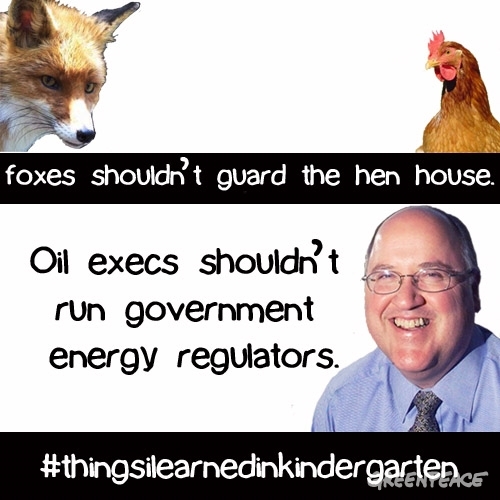All Around The Country, Regulators Are Getting Bullied Over Fracking by Rob Wile, May 16, 2013, Business Insider
More than four years after America’s hydraulic fracturing boom kicked off, conflicts of interest between officials charged with regulating the controversial practice and the oil and gas industry remain widespread. Meanwhile, in-depth studies of fracking’s effects on human health and the environment remain scant. Conflicts of interest and undue corporate influence among drilling regulators features prominently in “Gasland II,” documentarian Josh Fox’s follow-up to his high-profile 2010 film “Gasland.” “Gasland II” premiered at the Tribeca Film Festival last month.
…
“We know almost literally nothing about human health effects,” said Duke biology professor Rob Jackson, author of a study that found a correlation between drilling and methane in northeast Pennsylvania. “Without human health studies, it’s hard to conclude a process is safe.”
…
The most contentious rule dealt with disclosing what chemicals companies were using in their drilling. The industry is highly opposed to disclosure, ostensibly because it could be subject to freedom of information requests from competitors. …
One of the more striking examples Fox highlights in his film occurred in Texas, where two years ago the EPA found evidence a well was leaking methane gas into two homes near Fort Worth. Then, according to emails obtained by Energywire’s Mike Soraghan, former Pennsylvania Governor Ed Rendell appears to have intervened. From Energywire: An EPA attorney wrote that Rendell, acting as a “spokesman for Range,” met with [EPA Chief Lisa] Jackson in 2011 and “proposed certain terms to the administrator.” But the case didn’t settle for more than a year after that. When EPA and Justice Department officials in Washington, D.C., dropped the case, Range did not agree to do testing sought by the Texas-based EPA officials. They had wanted Range to test whether natural gas might be seeping into homes from the soil, but that was not part of the agreement. In the same case, the AP found that although the EPA had scientific evidence against Range, the agency stepped back after the company threatened not to participate in the agency’s ongoing fracking study. “Regulators set aside an analysis that concluded the drilling could have been to blame for the contamination,” AP’s Ramit Plushnick-Masti reported.
…
Meanwhile in Pennsylvania — ground zero of the natgas drilling boom — a recent report by the Public Accountability Initiative suggested a “revolving door” between state officials and oil and gas firms.
A few years ago in the town of Dimock, EPA regulators raised concerns about possible contamination and treatment systems from drilling activities performed by Cabot Oil and Gas. They raised the prospect of invoking federal authority over the area if Cabot was found to be using diesel fuel in its drilling (the feds cannot invoke the Safe Drinking Water Act to regulate fracking unless diesel fuel is being used). Yet they ended up not doing so, according to Laura Legere of the Scranton Times-Tribune: A lawyer for the regional EPA office said the agency never asked Cabot if it used diesel in its wells because the EPA was still working at the time to define what it meant by “diesel” as it developed regulations for wells fracked with the fuel. A Cabot spokesman did not respond to a question about the allegations of diesel use. Families in the area ended up settling with Cabot over the issue. [Emphasis added]
[Refer also to:

